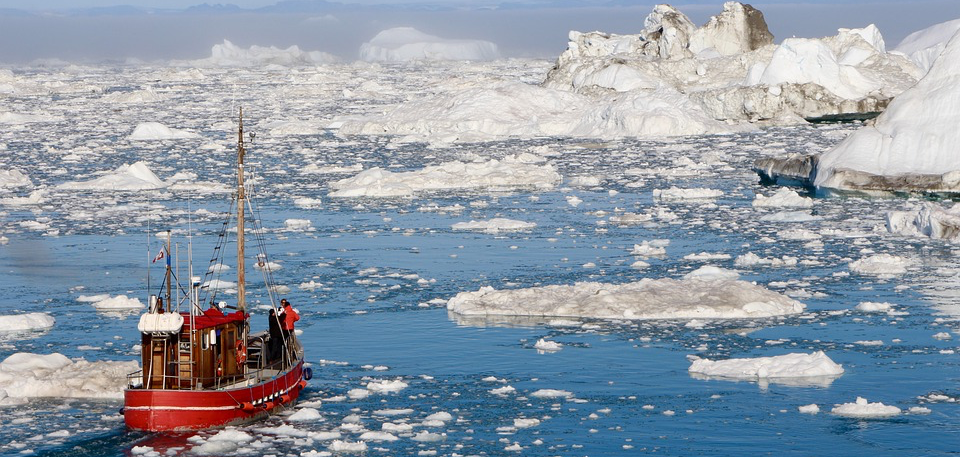
After years of warning, sea ice cover and other indicators are starting to exceed the limits of the old “normal” climate.
Scientists often speak of a “new Arctic” to describe the region's rapidly changing landscape. Temperatures are skyrocketing, sea ice is shrinking, and many experts believe the Far North is rapidly turning into something unrecognizable.
This week, new research confirms that a new arctic climate system is emerging.
In fact, some aspects of the Arctic climate have already changed beyond anything the region has known in the past century. The extent of sea ice has decreased by 31% since satellite recording began in 1979. Ice cover trends today have exceeded the limits of anything that would have been possible ago. just a few decades.
By the end of the century, if global temperatures continue to rise unchecked, other key elements of the Arctic climate - including air temperatures and precipitation patterns - could also be profoundly different from the old "normality" of the 20th century.
Study co-authors Laura Landrum and Marika Holland, researchers at the National Center for Atmospheric Research in Colorado, published their findings yesterday in the journal Nature Climate Change . The study, they say, is among the first to examine the timing of the emergence of the New Arctic - the point where climatic conditions lie even outside the furthest limits of what was previously “normal” - at both at sea and on land.
"The changes are so rapid and so dramatic that the Arctic has warmed significantly and its year-to-year variability is moving outside the bounds of past fluctuations, signaling a transition to a new climate." Laura Landrum told E&E News.
Landrum and Holland used large sets of climate models to study how the arctic climate has changed over the past century and what kinds of changes the next 100 years may hold in store for us. Looking ahead, they focused on a hypothetical severe climate scenario - a trajectory that many scientists see as the worst-case scenario if human societies do nothing to reduce their greenhouse gas emissions.
The researchers specifically looked at changes in the extent of arctic sea ice, air temperature, and precipitation patterns.
Sea ice, they found, has already declined beyond the limits of anything that would have been seen a few decades ago. In other words, at least one signal from the New Arctic - driven by climate change - has already emerged.
And the decline of sea ice will only get worse over time. In the extreme climate scenario, the extent of summer sea ice will fall below 1 million square kilometers - a threshold so low that most scientists consider the Arctic Ocean to be "ice free" at that time. - by the 2070s at the latest, and potentially decades earlier.
Air temperatures are expected to cross the critical threshold by the middle of this century, with fall temperatures changing the most rapidly. Changes in precipitation - that is, the shift from snow to rain - will represent a new Arctic shortly thereafter.
This makes sense, given how different aspects of the Arctic climate system relate.
Sea ice can have a profound effect on arctic temperatures. Ice has a shiny, reflective surface that helps radiate sunlight away from the Earth. Thick sea ice also helps insulate the ocean, trapping heat below the surface in winter and preventing it from escaping into the cold arctic air.
As sea ice thins and disappears, the ocean is able to absorb more heat in the summer. And in winter, that heat is able to escape through thinner ice and warm the atmosphere.
“You would expect ice to play a role in warming the temperature because of these feedbacks,” said Laura Landrum.
Rising temperatures, in turn, help speed up the transition from snow to rain.
The results confirm that a new Arctic is already emerging and that if global temperatures continue to rise at their current rate, the transformation to an unrecognizable climate system could be completed before the end of this century.
This is a clear sign that climate change is not a problem for the future - it is already radically reshaping the planet today. It is also a huge concern for the Arctic ecosystem and the human communities that depend on it.
A new Arctic will be warmer, rainier and much less frozen. Animals that were once common may disappear, while new species may settle in to take their place. Opportunities for hunting and fishing through sea ice may decrease. Shipping in the Arctic Ocean could increase dramatically as the ice clears.
Meanwhile, disaster planning can be an increasingly difficult task.
Community planners often design infrastructure, made to last a number of years or withstand a certain level of stress, by looking at past weather observations. But as the arctic climate changes, the past is no longer a good indicator of what to expect in the future.
“We are entering a period where the previous observations we have do not and cannot describe the time we are entering,” said Laura Landrum.
While the study provides a grim snapshot of a possible future, it isn't necessarily inevitable. Other studies have indicated that a more moderate climate scenario - one in which countries around the world dramatically reduce their greenhouse gas emissions over the next few decades - could block or prevent some of these changes.
But research shows that immediate action is needed.
"For those who live in the Arctic - whether human, animal, plant - climate change is not something in the future" , stressed Laura Landrum. “This is something happening now. "
Posted on 2021-10-01 09:51








Comments